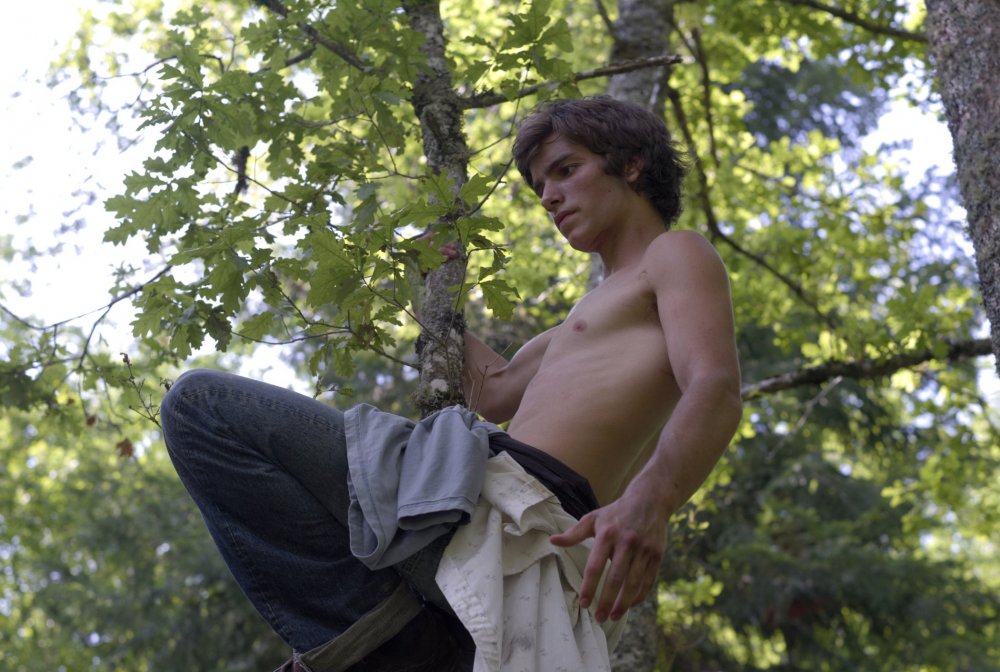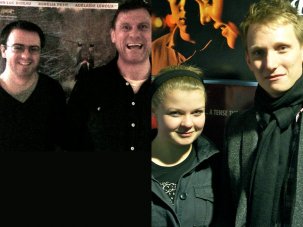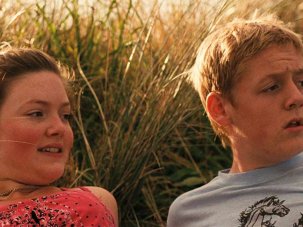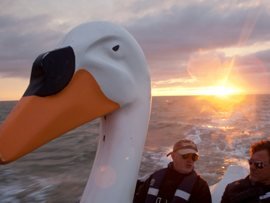Web exclusive

Ivul
You could say that British director Andrew Kötting’s reputation precedes him. The team at Sight and Sound’s HQ seemed to be preparing me for something in the vein of Gene Wilder’s Willy Wonka – unpredictable and eccentric. Luckily, in our meeting there were no candy-related incidents.
Ivul is Kötting’s third feature-length production, after 1997’s Gallivant and This Filthy Earth, his 2001 adaptation of Emile Zola’s La Terre. It deals with the breakdown of a French patriarchal family, after young brother and sister Alex (Jacob Auzanneau) and Freya (Adelaide Leroux) cross the line from sibling affection into something more unsettling. Their father, Ivul (Jean-Luc Bideau), tells Alex not to step foot on his land again – so in the sort of poetic flourish often associated with Kötting, Alex takes to the trees and rooftops, leaving his mother Marie and twin siblings Manon and Capucine, to struggle with the consequences of the fall-out.
The film is rife with poignant visuals and symbolic cuts to the landscape and surrounding nature, and in some ways is a homage to Kötting’s affinity with the countryside. It is also full of British wit and humour, strong performances and impressive sound production. Having missed out on Kötting’s previous work, I found Ivul a real pleasure to watch, and it seemed to be warmly received by the sell-out audience.
I had about ten minutes to question Kötting on his views of filmmaking, France, and Ivul itself. With a sense of trepidation, I proceeded to flatter him into submission, in the hope that doing so might extract a better dialogue between the two of us in the short time available.
This is the result of that sweet talk.
I’ve read several quotes labelling you a performing artist, more than a director.
Well, my roots in a way are in performance – I’m more than happy with the tag. Film is just the medium that I work with. But my roots were in performance, in the sense that I went through the art school system in the late 1970s and early 1980s, and out of that I found myself eventually doing an MA.
So were you always interested in film and filmmaking?
No. I never aspired to be a filmmaker, but I liked working with film. It was just one of many mediums. The first film I made was black and white, some surveillance footage – really cheap black and white film stock – that had just been dug up, and I processed it. I also performed a piece of work chasing after an image of a horse, trying to f*ck it up the arse. That became a three-reeler, where I improvised a voice-over monologue.
Do you prefer experimenting with short pieces, or the more extended feature-films?
In making feature films, it is really quite difficult to get a perspective – you can get immersed and lost in what you are doing. I find it one of the most difficult mediums to work with. When it’s finished, you do kind of think, “What have I done?” There are moments that can feel controlled, then there are other moments where it can become secondary. There is this idea of foreground and background, and I am as interested in the background as I am the foreground.
What do you find more difficult making features? Is it the editing, or keeping the cast in tune for a long period of time?
The cast are fine – they only need to commit for six to eight weeks, and their job is done. Actors and non-actors are a mix I really like. It offers you this psychotic sense of control and out of control. The edit – I love, but it drives you mad. I’ve only done three feature films, including this one, and each time, I’ve been on the brink of madness.
Even in your films, when there are often interesting visuals within each shot, is it boring to keep watching your work over and over in the edit?
It drives you absolutely bonkers. You start to think “Have I seen that? Is that the good shot? Is that the bit that came before that?” I lose track of the story, all the tension, the dynamics, characters. Sometimes, just out of want, you change it – you know, fuck it, we’ll just use the take that is really bad, and put that in for a while, see how that gets on.
Was it interesting working with three different generations of actors – the young twins, the teenagers, and the older generations? Was it a difficult dynamic on set?
It was a brilliant dynamic on set. The twins were non-actors, and the part of Alex wasn’t played by an actor. With the rest of the family, especially the father, Ivul, you can see how sometimes I “Cut” – I just yell “Action” and off we go, we see what happens. Occasionally the twins would just really infuriate me. The scene in the bed, when Ivul is just going up and down – that was a ten-minute take, and he [Jean-Luc Bideau] was just livid. I could sense it, but the twins were just having so much fun – so yes, it was a big happy family. I’m more interested in the ambience; I’m no fascist on set, I’m quite used to it, and I’m open for as much preparation, or improvisation, as they like.
So your scripts?
They’re springboards. For funders, it’s vital, but for me personally they are just templates. They are very loose approximations of what I’m trying to do with characters.
You mention funding. How do you go about pitching your ideas to raise the required amount of money?
For this, the funding originally came from BBC Scotland. The script went to the BBC and, to cut a long story short, they decided they didn’t want to make it. My two previous pictures had both done well in France, and the distributors over there put me in touch with a producer. She read the script, loved it, got it translated into French, and within two years she’d raised the money.
So you didn’t need to beg for the money?
She did all that. Before, there was all sorts from the UK; the Film Council were very committed at the beginning, then they lost interest. I was quite happy not to have to make it really. It was a big weight off my shoulders.
You adapted La Terre for your second film, and Ivul is set in France. What is it about France, or French culture, that interests you? Why couldn’t this film have been set it England, for example?
Because there was no money over here. After This Filthy Earth, they [UK financiers] weren’t that keen putting money into this kind of work. To answer your question, over the last 20 years I have spent a lot of time down in the French Pyrenees, and live in a kind of old, ramshackle, very isolated farmhouse with my wife and my daughter. Each year we go down there for three or four months. I’ve got roots down there.
You do seem to have an affinity with the landscapes. The cave scenes must have been extraordinary places to shoot.
Absolutely. I know the place really well; quite literally it is a magical bit of the world. It features in a really early piece of work I made years ago called Hoi Polloi (1990). It’s kind of like an entrance to Narnia. It’s really something of a starting point – Ivul is the second of a trilogy. La Terre was set on the earth, this film was set above the earth – with the whole idea of the kid going up into the trees – and the final part will be about going in, and going under the earth. The caves are the entrance to that third part.
The caravan at the end – the idea of a mobile home being lifted into the air – is a strong image. How did that idea come about?
The idea was always there. I had been working on the script – the character of Alex had made some sort of abode – and this was something very symbolic. It’s never really explained how it gets up there, but it’s there and [the audience] think “did he find it?” There is this ambiguity about what it is doing up there. The idea came from an assortment of things. I just loved the idea of this fantastical image, a caravan sitting up a tree; though at one point it was going to be an old car with no wheels. It came from an image I saw once, of a caravan in France after a flood some years ago. There it was, wedged in the foot of a tree. After the waters had subsided there was complete and utter chaos, and this caravan seemed so incongruous and yet, visually, quite stunning.
-
The Digital Edition and Archive quick link
Log in here to your digital edition and archive subscription, take a look at the packages on offer and buy a subscription.







